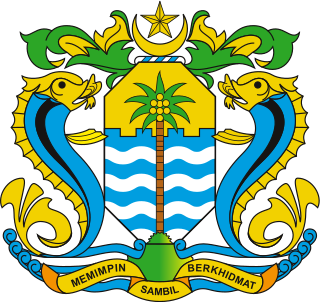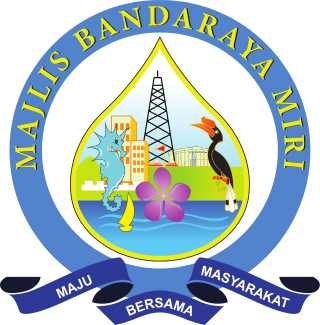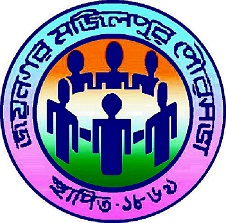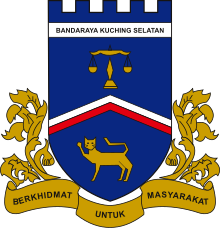History
During the days of the Brooke Administration, some semblances of the functions of the council were performed by the Public Works Department. Sir Charles Vyner Brooke was installed as the Third Rajah on 22 July 1918. In 1921 the Kuching Sanitary and Municipal Advisory Board was formed. Following a new legislation, the Board became the Municipal Authority for Kuching on 1 January 1934 marking the early beginning of what would in due course become the local authority for Kuching, known as the Kuching Municipal Board.
At the outbreak of hostilities in 1941, the Central Government was giving consideration to the question of according full municipal status to the Board, but the war interrupted this and the question was not considered again until the resumption of Civil Government in 1946, at which time Sarawak had also become a colony of Great Britain.
In 1947, it was found necessary to introduce a modified form of Committee System as the work of the Board had grown to such as extent as to make it impracticable for the Municipal Commissioners to deal with the various problems of administration in a single monthly meeting.
In 1949, the Governor of Sarawak directed that the Chairman of the Kuching Municipal Board should submit a comprehensive detailed scheme to convert the Municipality into a local government entity, financially self-supporting and managing its own affairs, subject to such safeguards as might be deemed advisable. As a result of this action the Municipality became autonomous on 1 January 1953.
The municipal council at this time was formed on a purely racial basis of twenty-four representatives of the public, with a British officer as chairman. The governor in council appointed the chairman, as he also did six other councillors of various nationalities who represented different interests in the lives of the local community. The other eighteen councillors with approval of the governor were nominated by the various associations, who looked after the interest of the Chinese, Malay, Indian, Ceylonese, Dayak and British communities.
In 1956, initiatives were made by the governor to plan for the first free election, which eventually took place on 4 November. A total of 58 persons offered themselves as candidates for the 9 wards and 278 seats on the new Council. The newly elected Council took office on 1 December 1956. The President and Vice President were elected from among the Councillors and held office for a period of one year, with eligibility for re-election. Free election lasted only for several years.
The 3-year term of office of the 1963 elected Councillors should have expired on 30 June 1966. However, due to certain political development in the State, the tenure of office was extended by the State Government and the Councillors who were elected at the 3rd local council elections in 1963 continued to hold office until 14 October 1981 when the council was restructured. The enactment of the Kuching Municipal (Amendment) (No.2) Ordinances 1977 made 15 December 1977 among other things, led the elective system by an appointment system of Councillors. It was provided that the council should consist of the chairman, the deputy chairman; and not less than eight and not more than twenty-four Councillors to be appointed by the Governor to serve a term not extending three years. This amendment Ordinance was only brought into force with effect from 15 October 1981 on which date a new set of Councillors were appointed and all the Councillors elected in 1963 ceased to hold office on 14 October 1981.
On 1 August 1988, the Municipality was elevated to city status, making it the fourth city in Malaysia after George Town, Kuala Lumpur and Ipoh. This historic date also saw the administrative division of the City into Kuching North (covering a significant part of the central areas of downtown Kuching, previously administered by the Kuching Municipal Council and including new areas across the Sarawak River, previously administered by the Kuching Rural District Council) and Kuching South (covering part of the areas previously administered by the Kuching Municipal Council to the east of downtown Kuching and come new areas to the south of the former Municipality, previously administered by the Kuching Rural District Council) comprising an area of 61.53 km2.
The Council of the City of Kuching South is a corporation established under the Local Authorities Ordinance, 1996. Like all other local authorities, it is essentially an authority providing public services within its area of jurisdiction comprising an area of 61.53 km2.
The council now consists of a Mayor, a Deputy Mayor and 30 Councillors, all of whom are appointed by the State Government of Sarawak. The State Government appoints the Councillors on a 2-year term, renewable at its discretion. The Councillors represent the various political component parties of the coalition government of Sarawak. The Councillors are responsible for formulating the Councils policies and for ensuring that the Administrator implements these policies in an efficient and effective manner.
The mode by which the council conducts its business is through the committee system. The Standing Committees normally meet once a month to deal with matters under their respective terms of reference. The Committees make decisions in the form of recommendations to the Full Council for its adoption at its ordinary meeting, which is usually held at the end of the month. The City Secretary is the Chief Administrative Officer of the City Council. Its various divisions, namely the Administration, the Treasury, the Building & Landscaping, the Engineering, the Rating and Valuation, the Public Health, and the Licensing undertake the functions of the Organisation. Each head of division controls expenditure as approved in the annual estimates of the council. The mode by which the council conducts its business is through the committee system. The Standing Committees normally meet once a month to deal with matters under their respective terms of reference. The Committees make decisions in the form of recommendations to the Full Council for its adoption at its ordinary meeting, which is usually held at the end of the month.
Appointed mayors of Kuching South
| No. | Mayor | Term start | Term end |
|---|
| 1. | Song Swee Guan | 1 August 1988 | 31 December 1996 |
| 2. | Chan Seng Khai | 1 January 1997 | 31 July 2005 |
| 3. | Chong Ted Tsiung | 25 September 2005 | 3 August 2007 |
| 4. | James Chan Khay Syn | 4 June 2008 | 31 August 2019 |
| 5. | Wee Hong Seng | 1 September 2019 | Incumbent |
Politics in Estonia takes place in a framework of a parliamentary representative democratic republic, whereby the Prime Minister of Estonia is the head of government, and of a multi-party system. Legislative power is vested in the Estonian parliament. Executive power is exercised by the government, which is led by the prime minister. The judiciary is independent of the executive and the legislature. Estonia is a member of the United Nations, the European Union, and NATO.

Local government is a generic term for the lowest tiers of governance or public administration within a particular sovereign state.
In many countries, a mayor is the highest-ranking official in a municipal government such as that of a city or a town. Worldwide, there is a wide variance in local laws and customs regarding the powers and responsibilities of a mayor as well as the means by which a mayor is elected or otherwise mandated. Depending on the system chosen, a mayor may be the chief executive officer of the municipal government, may simply chair a multi-member governing body with little or no independent power, or may play a solely ceremonial role. A mayor's duties and responsibilities may be to appoint and oversee municipal managers and employees, provide basic governmental services to constituents, and execute the laws and ordinances passed by a municipal governing body. Options for selection of a mayor include direct election by the public, or selection by an elected governing council or board.
An alderman is a member of a municipal assembly or council in many jurisdictions founded upon English law with similar officials existing in the Netherlands (wethouder) and Belgium (schepen). The term may be titular, denoting a high-ranking member of a borough or county council, a council member chosen by the elected members themselves rather than by popular vote, or a council member elected by voters.
A town council, city council or municipal council is a form of local government for small municipalities.
A municipal council is the legislative body of a municipality or local government area. Depending on the location and classification of the municipality it may be known as a city council, town council, town board, community council, rural council, village council, or board of aldermen.

The government of Louisville, Kentucky, headquartered at Louisville City Hall in Downtown Louisville, is organized under Chapter 67C of the Kentucky Revised Statutes as a First-Class city in the state of Kentucky. Created after the merger of the governments of Louisville, Kentucky and Jefferson County, Kentucky, the city/county government is organized under a mayor-council system. The Mayor is elected to four-year terms and is responsible for the administration of city government. The Louisville Metro Council is a unicameral body consisting of 26 members, each elected from a geographic district, normally for four-year terms. The Mayor is limited to a two consecutive term limit, while members of the Louisville Metro Council are not term limited.

The Commission of Kuching North City Hall is the commission which administers the northern part of the city of Kuching in the state of Sarawak, Malaysia. This commission was established after the city was officially granted city status on 1 August 1988. Their jurisdiction covers an area of 369.48 square kilometres.

The Penang Island City Council is the local government that administers the city of George Town, which includes the entirety of Penang Island. The city council, which has jurisdiction over an area of 306 km2 (118 sq mi), falls under the purview of the Penang state government.
The local government in Malaysia is the lowest tier of government in Malaysia administered under the states and federal territories which in turn are beneath the federal tier. Local governments are generally under the exclusive purview of the state governments as provided in the Constitution of Malaysia, except for local governments in the federal territories. The federal Ministry of Local Government Development plays a role in co-ordinating and standardising the practices of local governments across the country.

In India, the Urban Local Bodies (ULBs), also called municipalities, are self-government institutions responsible for the administration of cities, towns, and transitional areas within a state or Union Territory. The 74th amendment to the Constitution of India in 1992 provided constitutional framework for the establishment of Urban Local Bodies.
Local government in Pennsylvania is government below the state level in Pennsylvania. There are six types of local governments listed in the Pennsylvania Constitution: county, township, borough, town, city, and school district. All of Pennsylvania is included in one of the state's 67 counties, which are in total subdivided into 2,560 municipalities. There are currently no independent cities or unincorporated territories within Pennsylvania. There is only one incorporated town in Pennsylvania, Bloomsburg.
Local government is the third and lowest level of government in Sri Lanka – after the central government and provincial councils. The local government bodies are collectively known as local authorities. They are responsible for providing a variety of local public services including roads, sanitation, drains, housing, libraries, public parks and recreational facilities.

The Municipal Government of Karachi is the administrative body for the city of [[Karachi], [Sindh]], Pakistan. Presently the Municipal Local Government Karachi consists mainly of the Karachi Metropolitan Corporation, headed by the Mayor or Administrator.

The Miri City Council is the city council which administers the city of Miri in the state of Sarawak, Malaysia. This council was established after the city was officially granted city status on 20 May 2005. Initially covering 997 square kilometres, the area of jurisdiction of the city was expanded to over 5,000 square kilometres with the addition of Bario sub-district in 2015.

Padawan Municipal Council is a local authority which administers Padawan municipality of the Kuching District, Sarawak, Malaysia. The agency is under the purview of Sarawak Ministry of Local Government and Community Development. MPP headquarters is located at Kota Padawan, at 10th mile away from Kuching city centre. The council aimed to improve infrastructure development and provide quality services to its residents besides preserving the environment.

Jaynagar Majilpur Municipality is an urban local body of the South 24 Parganas district in the Indian state of West Bengal. It is responsible for the civic infrastructure and administration of the city of Jaynagar Majilpur. This civic administrative body administers an area of 5.85 km2 (2.26 sq mi). It is divided into 14 administrative wards.
The 2019 Colombian regional and municipal elections were held on Sunday, 27 October 2019 in Colombia to elect the governors of the 32 departments, deputies to departmental assemblies, mayors of 1,102 municipalities, municipal councillors and aldermen on local administrative boards.











